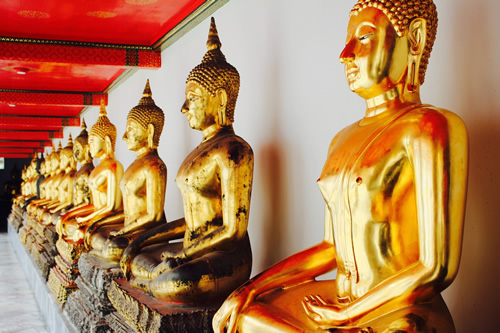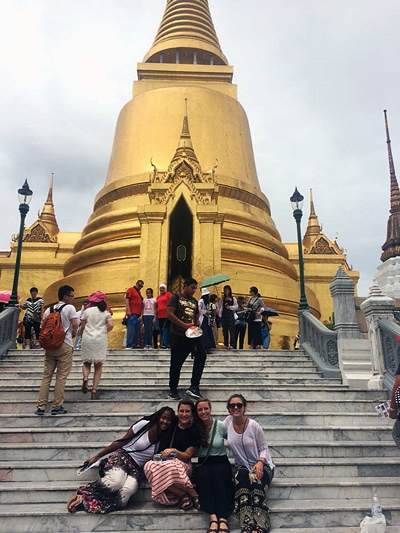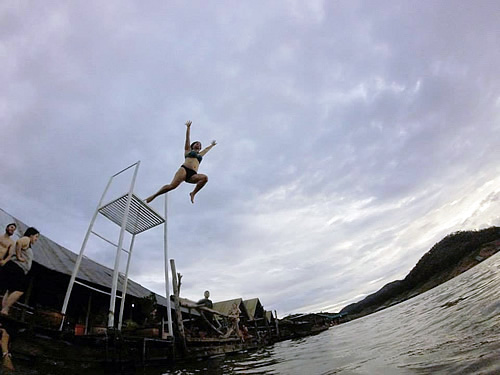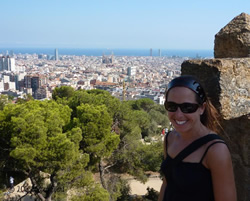Summer Study and Transitions Abroad in Thailand
An Interview by Stacey Ebert
 |
| Gold Buddhas in Bangkok. |
Sarah Hecht was the Treasurer of the Class of 2012 at Farmingdale High School, and I was her class advisor. We met when she was fourteen. Sarah is now in the senior year at her university. Assume you remember high school (or are there presently). In that case, officers spend much time with each other. Their advisors plan, organize, facilitate, and schedule activities and events for their classmates and the school. Such activities provide educational avenues for unique conversations outside of the traditional classroom. I learned about Sarah’s volunteer experience in Guatemala, her genuine concern for others, her interest in the world outside her hometown, and her profound effect on others due to her positive and outgoing personality.
The exuberant, active teenager has grown into a mature leader. The high school student officer and swim captain is a Homecoming chair of her sorority, Vice President of Internal Programming for the Inter-Greek Council, and a Master's candidate in Public Administration at her Long Island, New York, university. Sarah’s parents instilled in all three of their children a love of learning, a joy of travel, and a desire to help others. Subsequently, Sarah "transitioned abroad" into a summer program in Chiang Mai, Thailand. There, she developed even greater self-confidence, increased her ever-growing love of adventure, and realized many of the benefits of educational travel and life abroad.
 |
| Sarah Hecht and travel friends at Bangkok's Grand Palace. Photo courtesy of Sarah Hecht. |
Stacey Ebert: When and how did you know you were interested in studying abroad?
Sarah Hecht: I have two older brothers, and although they never studied abroad, they talked about it a lot. I’ve always loved new adventures and learning … so why not combine the two! My best friend studied abroad in the Czech Republic, and I lived through her adventure via social media. I was envious of all she was learning, becoming, and experiencing. Sadly, my program limits me from taking an entire semester abroad, but; I could do a summer program.
Stacey Ebert: What made you choose the program in Chiang Mai, Thailand, for your studies?
Sarah Hecht: I like doing things far out of my comfort zone. I wanted to visit a country that had a completely different language, culture, and atmosphere. I wanted to feel culture shock. In my sophomore year of college I met a girl who studied abroad in Thailand. She told me about the elephants she cared for, the food she experienced, and the language she learned. Chiang Mai interested me the most because it had every aspect of a city, but on a smaller scale. I love the atmosphere a city provides, but I can get overwhelmed if I’m somewhere that is a little too large. Chiang Mai was more isolated than the other cities, and it had fun nightlife and small walkable markets. I hoped it would give me everything I wanted to experience. It did.
Stacey Ebert: How would you describe the transition from being an American student at a U.S. university to studying abroad in Asia?
Sarah Hecht: I had to wear a uniform every day. It consisted of a long skirt, a white button-down, a belt with the university logo, and a pin. Some students would show up some days, missing part of their uniform, which upset the professors. The professors were some of the most intelligent people I have ever met, and most spoke exceptional English. They were extremely passionate about teaching and didn’t stand for any excuses. Our professors had extremely high expectations of us, and none of us wanted to let them down. The university had a lot of similarities. There were student-run organizations and businesses, extra help, printing stations, and fun places to eat. For me, the biggest difference was the size. Long Island University at CW Post has about 4,000 undergrads, while Chiang Mai University has about 33,000. It was HUGE. I was fortunate we only had to take classes in one building because I think I would have gotten lost a lot. The biggest transition was figuring out the professors, the campus, and where to get the best food. We only had a month, so by the time we all got used to it, it was time to leave. It was so different, but it was an experience I am so fortunate I had.
Stacey Ebert: What has been easier than you expected to get used to abroad? What has been more difficult?
Sarah Hecht: The easiest thing to get used to was the weather. I thought I would be melting every day, but before I knew it, I had adjusted. Learning the language and getting around was a lot easier than I expected. After the first week, I knew how to get to the main spots in town and say essential words. One of the easiest things was making friends. I was nervous that it was going to be difficult. By the third day, it was as if we had known each other our entire lives. The most challenging thing was getting used to the food. I thought I was ready for Thai cuisine but was very wrong. I love Thai food, but I’ve been eating ‘Americanized’ Thai food for years. Actual food from Thailand is much different. There were many unique-looking meat and fish dishes, and my stomach took a while to get used to it all. It took me two weeks to figure out what to eat without getting sick. I decided to become more of a vegetarian during my time there. However, I made sure I still submerged myself in the food. There was Western food, too, but I wanted to try new things. It was very different, but after I figured out what worked and what didn’t for me, I loved everything I ate.
Stacey Ebert: What do you feel you gained by studying abroad in Thailand?
Sarah Hecht: I gained self-esteem and confidence. Going on this trip alone taught me a lot about my own capabilities. I learned how to love who I am and to take every new experience that comes my way, and I left feeling like I could do anything. I gained the ability to learn how to live in a new culture. I feel like I can go anywhere, be anyone, and succeed. I’m very thankful I could experience it and return to America as a better version of myself.
Stacey Ebert: Now that you have experienced longer-term travel and flying far away, where do you want to go next? How does the length of time and distance enter into your travel destination decisions?
Sarah Hecht: To be completely honest, I am not sure where I want to go next. I’ve been to Guatemala, Israel, and Thailand, so it would be wonderful to experience some parts of Europe. I would love to live abroad for an entire year. It would be cool to experience working in another country, and having a whole year to explore someplace completely different would be amazing. Length of time and distance isn’t a thought because I feel like I can do anything after an 18.5-hour plane ride and being somewhere for a month. Living somewhere for an extended period would be amazing, but where and when is the question. My biggest goal right now is to finish my degree, and then maybe I can use it to help me find a place to travel abroad. I have a lot of goals and wants, and I think traveling right now is more of a want. My main goal is to find a job that I love. If I am lucky, maybe I can fit my desire to travel into my career … that would be the best ever.
Stacey Ebert: What advice would you offer to high school students today when choosing a program abroad? Would you suggest university study, volunteer opportunities, or short-term study programs? Why?
Sarah Hecht: I would suggest a long-term study program. I felt the month I had was too short! When you do a long-term study program, you can fit in volunteer opportunities alongside studying. I met people who had been in Thailand for months, and they could travel, volunteer, and study. I think that is the best way to do it. It takes a while to get used to a new destination, but you might not want to leave once you get used to it. If I had been there longer, I could have studied and volunteered. I suggest that high school students volunteer abroad (if even briefly). Volunteering at a young age teaches you something special. You appreciate life so much after volunteering somewhere, regardless of destination.
Stacey Ebert: How do you feel you’ve grown as an individual through your travels while studying abroad?
Sarah Hecht: I’ve learned how to appreciate other cultures, as well as how to enjoy my own. I learned how fortunate I am for what I have and how much I can continue learning. It was eye-opening, and I came back wanting to share what I experienced. This trip helped my self-confidence and courage. It really helped me grow and realize how beautiful life is. I learned everything can get stressful, but the freakouts aren’t necessary. Everything will work out, and I can now see how beautiful life is when I can take a step back and enjoy it. I learned not to rush through what I’m doing and to have patience and courage in life’s adventures.
Stacey Ebert: How much of your time was spent in a community of Americans instead of locals?
Sarah Hecht: I spent a lot of time with Americans. We had meetings a few times during the trip where we got to sit down with Thai students our age. We also had a Thai staff member. We spent much time with the people on our trip, but we also went out and met other travelers and locals.
Stacey Ebert: What helped you in your transition abroad?
Sarah Hecht: The biggest help was the other people on the trip. Together, we shared our concerns and excitement about being abroad. If it wasn’t for them, I think adjusting may have taken me a lot longer. Meeting new, open-minded people like myself really helped in the transition.
Stacey Ebert: If you had to do it again, would you still choose to travel with short programs, or would you choose to study abroad in one location for a semester or year? Why?
Sarah Hecht: If I could do it again, I would go to Thailand for an entire semester. The longer you stay, the more you can experience. I could have volunteered to help with the elephants if I stayed longer. If I stayed longer, I would have learned more of the language and found more food I enjoyed. By the time I was really used to it all, I had to leave.
Stacey Ebert: Is there anything you wish you knew about the "transition" before taking the plunge?
Sarah Hecht: No, not really. I am glad I went in with only the necessary information because I had no expectations. I think the most important thing is to go with an open mind. New surroundings are good for the soul. Keeping your mind and heart open is the best way to have a smooth transition.
 |
| Sarah Hecht at the Floating Houses. Photo courtesy of Sarah Hecht. |
 |
Stacey Ebert is a traveler at heart who met her Australian-born husband while on a trip to New Zealand. Stacey was an extracurricular advisor and taught history in a Long Island public high school for over fifteen years, enjoying formal and informal educational practices. After a one-year honeymoon around the world and significant long-term travel, travel and its many gifts changed her perspective. She has since left the educational world to focus on writing and travel. She is energetic and enthusiastic about long-term travel, finding what makes you happy, and making the leap. She is an event planner, yogi, and dark chocolate lover in her spare time, spending as much time as possible with her toes in the sand. Check out her website at thegiftoftravel.wordpress.com for more of her travel musings. |
|
